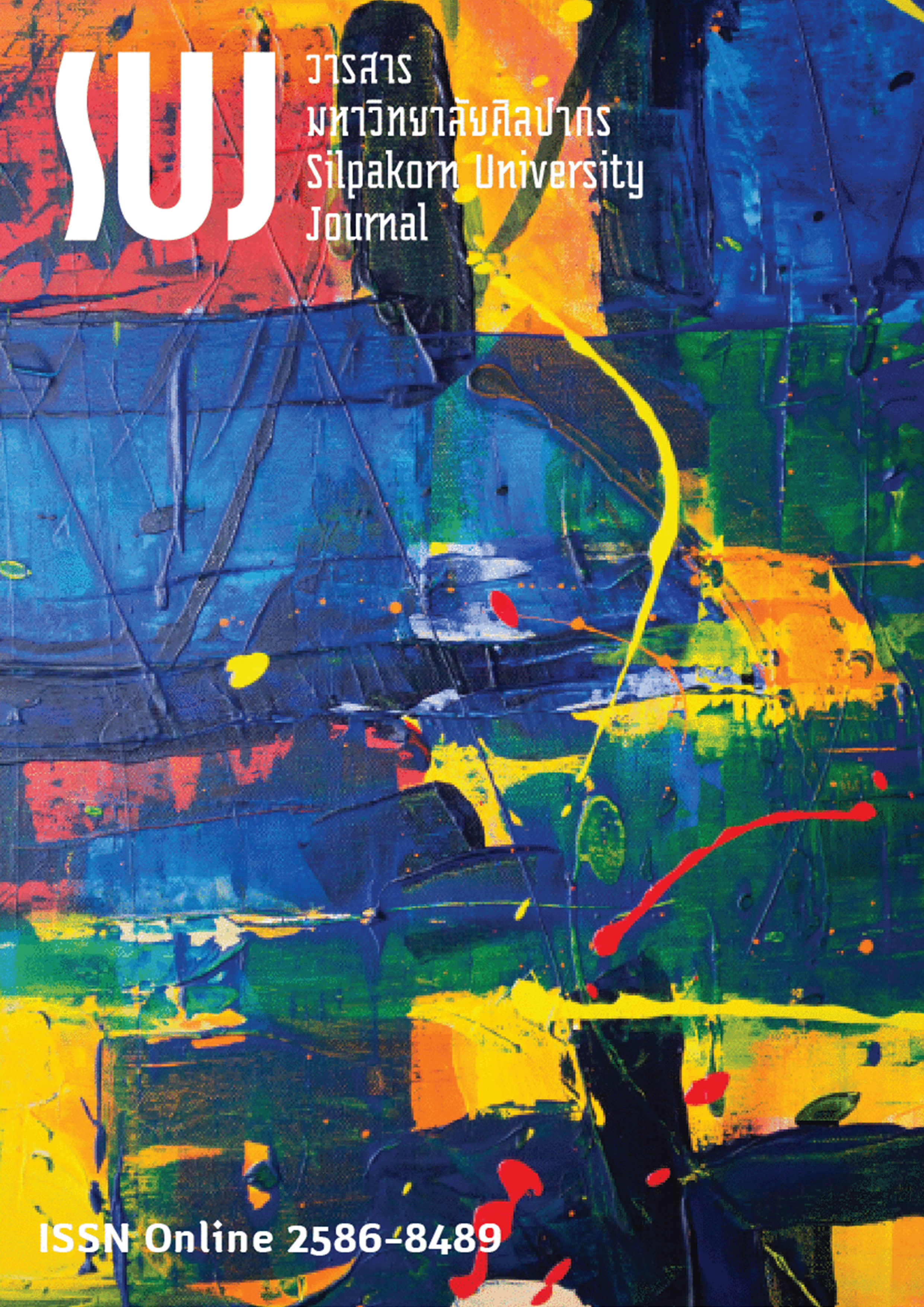การพัฒนาทุนมนุษย์เพื่อการท่องเที่ยวโดยชุมชนบ้านบางเทา จังหวัดภูเก็ต (Human capital development for community-based tourism: A case study of Ban Bangtao community, Phuket)
Main Article Content
Abstract
งานวิจัยเรื่องนี้ มีวัตถุประสงค์เพื่อศึกษาความต้องการจำเป็น และการสร้างแนวทางการพัฒนาทุนมนุษย์เพื่อการท่องเที่ยวโดยชุมชน ใช้วิธีวิจัยแบบผสมโดยเก็บรวบรวมข้อมูลเชิงปริมาณด้วยแบบสอบถามประชาชน จำนวน 396 ตัวอย่าง แบบสอบถามนักท่องเที่ยวชาวไทยและชาวต่างประเทศ จำนวน 384 ตัวอย่าง และเชิงคุณภาพด้วยการสัมภาษณ์แบบเจาะลึก จำนวน 16 ตัวอย่าง และการสนทนากลุ่ม จำนวน 2 ครั้ง วิเคราะห์ข้อมูลเชิงปริมาณด้วยสถิติเชิงพรรณนา และค่าดัชนีจัดเรียงลำดับความต้องการจำเป็น (PNIModified) และเชิงคุณภาพด้วยการวิเคราะห์เชิงเนื้อหา ผลการศึกษาพบว่า ในทัศนะประชาชน มีค่า PNIModified ≥ 0.30 จำนวน 14 รายการ ความต้องการจำเป็นสูงที่สุด คือ ทักษะการสื่อสารการตลาดแบบออนไลน์ รองลงมา คือ ทักษะการจัดทำบัญชีครัวเรือน และความรู้ในการบริการการท่องเที่ยว ในทัศนะนักท่องเที่ยวไม่มีค่า PNIModified ≥ 0.30 มีความต้องการจำเป็นสูงที่สุด คือ ทักษะการสื่อสารภาษาต่างประเทศอื่น สำหรับนักท่องเที่ยวชาวไทย มีความต้องการจำเป็นสูงที่สุด คือ ทักษะการสื่อสารภาษาอังกฤษ สำหรับนักท่องเที่ยวต่างชาติ มีความต้องการจำเป็นสูงที่สุด คือ ความรู้การเป็นผู้ประกอบการการท่องเที่ยวโดยชุมชน ผลจากการศึกษาสามารถนำไปปรับใช้ในการพัฒนาทุนมนุษย์ในประเด็นการท่องเที่ยวโดยชุมชน การสื่อสารการตลาดออนไลน์ การทำบัญชีครัวเรือน การพัฒนาคุณภาพชีวิต และอาหารฮาลาล เป็นต้น รวมทั้งเป็นแนวทางในการกำหนดนโยบายและแต่งตั้งคณะกรรมการขับเคลื่อนการท่องเที่ยวโดยชุมชน เพื่อให้เกิดการสร้างเครือข่ายความร่วมมือในการแลกเปลี่ยนความรู้ การพัฒนาทักษะการสื่อสารที่จำเป็นเพื่อรองรับการท่องเที่ยวโดยเฉพาะภาษาต่างประเทศ เช่น ภาษาจีน ภาษารัสเซีย การสร้างจิตสำนึกในการอนุรักษ์วัฒนธรรมท้องถิ่นทั้งนี้ เพื่อให้ทุนมนุษย์ที่มีอยู่ในชุมชนสามารถขับเคลื่อนการท่องเที่ยวได้อย่างยั่งยืนสืบไป
This research aims to study the needs and the creation of guidelines on human capital development for community-based tourism through data collection in 2020 using a mixed research method. The quantitative data was collected from 396 questionnaires for the general public and 384 questionnaires for Thai and foreign tourists and was analyzed by descriptive statistics and the Modified Priority Needs Index (PNIModified). The qualitative research was conducted through 16 in-depth interviews and 2 group discussions and was analyzed through content analysis. The results of the study showed that in the public view, there were 14 items of PNIModified ≥ 0.30. The highest need was online marketing communication skills, followed by household accounting skills and knowledge of tourism services. In the view of tourists, there was no value of PNIModified ≥ 0.30 and the highest need is communication skills in other foreign languages. For Thai tourists, the highest need is English communication skills. For foreign tourists, the highest need is the knowledge of community-based tourism entrepreneurship. The results of the study can be applied to develop human capital in the areas of community-based tourism, online marketing communication, household accounting, quality of life improvement, and halal food. Moreover, they also serve as a guideline to formulate policies and form a committee to drive community-based tourism in order to create a network of cooperation in knowledge exchange, develop communication skills in other foreign languages such as Chinese and Russian, and raise awareness of cultural conservation, which therefore enable human capital to drive sustainable tourism.
Downloads
Article Details

This work is licensed under a Creative Commons Attribution-NonCommercial-NoDerivatives 4.0 International License.
References
Alamu, A. P. (2016). Human Capital Development Strategies for the Tourism, Hospitality, and Leisure Industry. Doctoral dissertation, Walden University, Minnesota, USA.
Becker, G. S. (1994). Human Capital: A Theoretical and Empirical Analysis with Special Reference to Education, Third Edition. National Bureau of Economic Research. [Online]. Retrieved April 6, 2020 from https://www.nber.org/books/beck94-1
Cherngtalay Subdistrict Administrative Organization. (2020). Information on the Area of Cherngtalay Subdistrict Administrative Organization (ข้อมูลสภาพพื้นที่). [Online]. Retrieved May 2, 2020 from https://sites.google.com/site/chernglay/khxmul-sphaph-phunthi
Department of Tourism, Ministry of Tourism and Sports. (2018). Community Base Tourism Standard (มาตรฐานการท่องเที่ยวโดยชุมชน). Bangkok: Chulalongkorn University Press.
Goldin, C. (2014). Human Capital. [Online]. Retrieved April 6, 2020 from https://scholar.harvard.edu/files/goldin/files/human_capital_handbook_of_cliometrics_0.pdf
Keeley, B. (2009). The Value of People. In Human Capital: How what you know shapes your life, (pp. 21-37). Paris: OECD Publishing. [Online]. Retrieved May 7, 2020 from https://read.oecd-ilibrary.org/education/human-capital/the-value-of-people_9789264029095-3-en#page1
Marchoo, Witchuta, & Morasin, Patida. (2017). Human capital development for sustainable tourism of Phangan Island, Surat Thani (การพัฒนาทุนมนุษย์เพื่อการพัฒนาการท่องเที่ยวอย่างยั่งยืนของเกาะพะงัน จังหวัดสุราษฎร์ธานี). Journal of International and Thai Tourism, 13(2): 81-104.
Ministry of Tourism and Sports. (2017). Strategy of the Ministry of Tourism and Sports, Issue 4 (2017-2021) (ยุทธศาสตร์กระทรวงการท่องเที่ยวและกีฬาฉบับที่ 4 (พ.ศ. 2560-2564)). Bangkok: MOTS.
Namwong, Sathapanick. (2015). The Development of Community Base Tourism Plan Bannatonchan, Si Satchanalai District, Sukhothai Province (การพัฒนาแผนการท่องเที่ยวโดยชุมชน บ้านนาต้นจั่น อำเภอศรีสัชนาลัย จังหวัดสุโขทัย). Master’s dissertation, Naresuan University, Phitsanulok, Thailand.
National Tourism Policy Committee. (2017). National Tourism Development Plan, Issue 2 (2017-2021) (แผนพัฒนาการท่องเที่ยวแห่งชาติ ฉบับที่ 2 (พ.ศ. 2560-2564)). Bangkok: The War Veterans Organization of Thailand Printing.
Prasong, Kanokporn. (2019). Phuket Tourism and Sports Lead the Media and Tour Operators to Assess the Potential of Tourism Networks at Ban Bang Tao Tourism Community, Cherngtalay Sub-District, Thalang District, Phuket Province (ท่องเที่ยวและกีฬาจังหวัดภูเก็ต นำสื่อมวลชนและผู้ประกอบการบริษัทนำเที่ยวลงพื้นที่ประเมินศักยภาพเครือข่ายการท่องเที่ยว ณ ชุมชนท่องเที่ยวบ้านบางเทา ตำบลเชิงทะเล อำเภอถลาง จังหวัดภูเก็ต). National News Bureau of Thailand. [Online]. Retrieved April 26, 2020 from https://thainews.prd.go.th/th/news/detail/TCATG190616143422302
Schultz, T. W. (1961). Investment in human capital. The American Economic Review, 51(1): 1-17.
Silpcharu, Thanin. (2012). Research and Statistical Analysis with SPSS and AMOS (การวิจัยและวิเคราะห์ข้อมูลทางสถิติด้วย SPSS และ AMOS). Bangkok: Business R&D.
Singh, R. R. (1991). Education for the Twenty-First Century: Asia-Pacific Perspectives. Bangkok: UNESCO Principal Regional Office for Asia and the Pacific.
Siriwaiprapan, Somsri, & Soonthonsmai, Vuttichat. (2016). A collaborative human capital development model for small spa and Thai massage business in Pattaya (รูปแบบการพัฒนาทุนมนุษย์ในวิสาหกิจขนาดย่อม : กลุ่มสปาและนวดแผนไทยในเมืองพัทยา). Moder Management Journal, 14(1): 77-90.
United Nations. (2016). Guide on Measuring Human Capital. [Online]. Retrieved May 27, 2020 from https://unece.org/DAM/stats/publications/2016/ECECESSTAT20166_E.pdf
Wongwanich, Suwimon. (2005). Needs Assessment Research (การวิจัยประเมินความต้องการจำเป็น). Bangkok: Chulalongkorn University Press.


